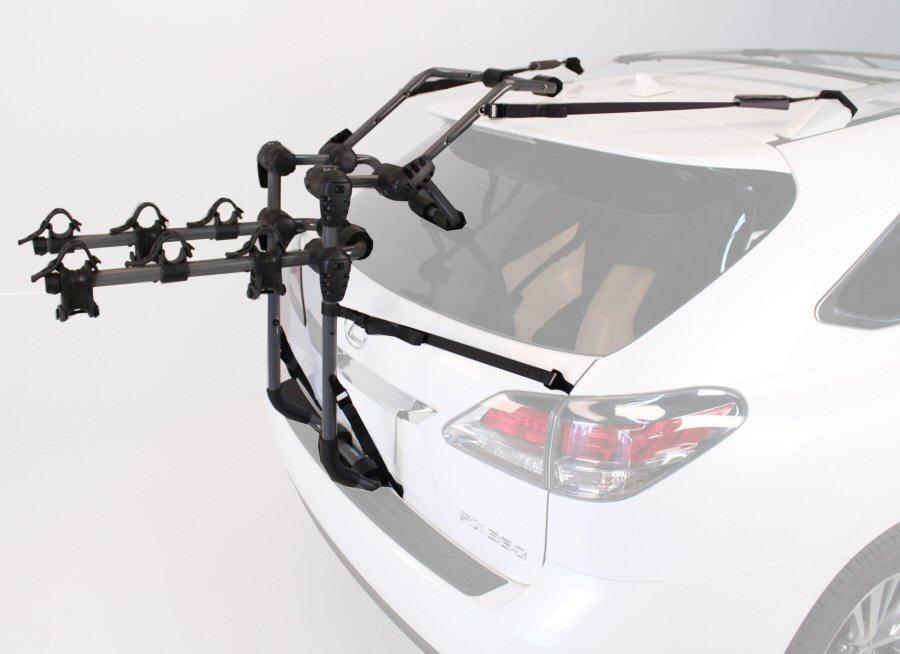

Cycling is an exhilarating and eco-friendly way to explore the world around you. Whether you’re a casual rider or a cycling enthusiast, one thing is clear: finding the right bike rack is essential for transporting your bicycles safely and conveniently. In this comprehensive guide, we’ll help you answer the question, “What’s the best bike rack for me?” We’ll cover all the key aspects, from types of bike racks to top brands and products, ensuring you make an informed decision.
Before diving into the specifics of bike racks, it’s important to understand why you need one. Bike racks offer several key benefits:
Transporting your bikes on a dedicated bike rack is safer than other methods. It reduces the risk of accidents, damage to your vehicle, and ensures your bikes are securely fastened.
Bike racks make it easy to load and unload your bicycles. You won’t need to disassemble your bike or cram it into your vehicle.
Racks help protect your bikes. They prevent damage from contact with the vehicle and reduce exposure to road debris, preserving your bike’s condition.
With a bike rack, you free up interior space in your vehicle for passengers or additional gear.
While there are alternatives like folding your bike’s seats or using bike covers, dedicated bike racks offer the best combination of safety, convenience, and protection for your bicycles.
There are several types of bike racks available, each with its own advantages and considerations:
Hitch racks are mounted on your vehicle’s hitch receiver. They are easy to install and remove, making them a convenient option. Popular brands for hitch racks include Thule and Kuat.
Roof racks are installed on the roof of your vehicle. They are versatile and can accommodate various types of bikes. Yakima and RockyMounts are well-known brands for roof racks.
Trunk racks are attached to your vehicle’s trunk or rear hatch. They are a cost-effective option and work well for lighter loads. Saris and Allen Sports offer reputable trunk rack options.
These racks are designed for vehicles with rear-mounted spare tires, such as SUVs and Jeeps. The Thule Spare Me and Yakima SpareRide are popular choices for spare tire racks.
Platform racks provide a stable platform for your bikes and are known for their ease of use. 1Up USA and North Shore Racks offer high-quality platform racks.
The choice of rack type depends on your vehicle, the number of bikes you want to transport, and your personal preferences.
Selecting the right bike rack involves considering various factors:
Ensure the rack you choose is compatible with your vehicle’s make and model.
Determine how many bikes you plan to transport. Some racks can carry multiple bikes.
Check the dimensions of your bikes to ensure they fit comfortably on the chosen rack.
Set a budget for your bike rack. Racks come in a wide price range, so it’s essential to find one that suits your financial constraints.
Consider how easy it is to load and unload bikes from the rack, especially if you plan to use it frequently.
By taking these factors into account, you can narrow down your options and find a bike rack that perfectly suits your needs.
When shopping for a bike rack, pay attention to these key features:
Ensure the rack can support the weight of your bikes. Different racks have varying weight capacities.
Look for a rack that’s easy to install on your vehicle. Some racks come with tool-free installation options.
Quality materials like corrosion-resistant aluminum or sturdy steel enhance the rack’s durability.
Some racks come with built-in locking systems to prevent theft or tampering.
Check if the rack is compatible with your specific bike type, whether it’s a road bike, mountain bike, or e-bike.
Tilting Feature: Some hitch racks offer a tilting feature that allows access to the rear of your vehicle without removing the bikes.
By prioritizing these features, you’ll find a bike rack that meets your requirements and provides long-lasting value.
Thule is a reputable brand known for its wide range of bike racks. The Thule T2 Pro is a popular hitch rack known for its durability and versatility.
Yakima offers a variety of bike racks, including roof and hitch racks. The Yakima HighRoad is a top-rated roof rack known for its secure hold and easy installation.
Read our Yakima HighRoad Review
Kuat is recognized for its well-crafted hitch racks. The Kuat NV 2.0 is a versatile option with a sleek design and various add-on accessories.
Saris offers high-quality trunk racks, with the Saris Bones being a reliable choice for ease of use and compatibility with various vehicles.
Rock Mounts produces durable and user-friendly platform racks. The RockyMounts MonoRail Solo is known for its utility & robust construction.
Read our RockyMounts MonoRail Solo Review
Shop RockyMounts MonoRail Solo
These brands provide reliable options, and the mentioned products offer a diverse range of features to meet different needs and preferences.
Follow the manufacturer’s instructions for proper installation. Make sure the rack is securely attached to your vehicle.
When loading your bikes onto the rack, be sure to distribute the weight evenly and use straps or tie-downs to secure them in place.
Regularly inspect your rack for wear and tear. Lubricate moving parts as needed and clean it to prevent corrosion.
Practice loading and unloading your bikes before heading out. This will help you become proficient and avoid any hassles on the day of your cycling trip.
In addition to a bike rack, consider these essential accessories:
Invest in high-quality bike locks to secure your bikes to the rack and prevent theft.
Protect your bikes from the elements with bike covers, especially if you store them on an external rack.
Depending on your bike type, you might need adapters or carriers to ensure a secure fit on the rack.
Consider a portable bike stand or repair stand for maintenance and repairs while on the road.
Ensure that your bikes are evenly distributed on the rack to maintain vehicle balance.
Be cautious when loading and unloading your bikes to prevent accidents or damage to your vehicle.
Be aware of low clearance obstacles when using a roof rack, such as low bridges or parking garages.
Use high-quality straps and tie-downs to secure your bikes to the rack. Check them periodically for signs of wear.
Some regions may have specific regulations for bike transportation, so it’s essential to be aware of these rules.
By following safety considerations, you’ll ensure a secure and trouble-free journey to your cycling destination.
Let’s address some common questions related to bike racks and their use:
Q: Can I use a hitch rack on a vehicle without a hitch receiver? A: You’ll need a hitch receiver to use a hitch rack. If your vehicle doesn’t have one, you can consider roof racks or trunk racks as alternatives.
Q: Are there bike racks that can accommodate fat tire bikes or e-bikes? A: Yes, many bike racks are compatible with fat tire bikes and e-bikes. Look for racks with adjustable cradles or additional accessories for these bike types.
Read out article about on the 7 Best Bike Racks for eBikes
Q: Can I leave my bike rack on my vehicle when not in use? A: You can leave the rack on your vehicle, but it’s advisable to remove it periodically for cleaning and maintenance. Some roof racks may create additional wind resistance and impact fuel efficiency.
Q: Do bike racks require any special care or maintenance? A: Regularly inspect your bike rack for wear and tear, clean it as needed, and lubricate moving parts. Also, check the straps and locks for proper functioning.
Selecting the ideal bike rack is a crucial step in ensuring a safe and enjoyable cycling experience. With the right rack, you can confidently transport your bikes to your favorite cycling destinations. Now that you’re equipped with essential information, you can make an informed decision to find the perfect bike rack for your needs.
For the most up-to-date information on bike racks and accessories, be sure to check the latest offerings from reputable brands and retailers.






Precisely what I was searching for, thanks for putting up.
Comments are closed.